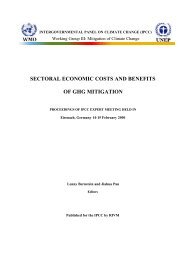Pacific Islands Environment Outlook - UNEP
Pacific Islands Environment Outlook - UNEP
Pacific Islands Environment Outlook - UNEP
Create successful ePaper yourself
Turn your PDF publications into a flip-book with our unique Google optimized e-Paper software.
28<br />
POLICY RESPONSES<br />
Coordinating Committee (SPOCC) to develop a<br />
Regional Development Strategy and sustainable<br />
development framework that incorporates the key<br />
linkages between the various development sectors.<br />
Sustainable management of these sectors, including<br />
agriculture, health and marine resources, is being<br />
actively promoted through the SPOCC working groups.<br />
In 1996 the South <strong>Pacific</strong> Forum adopted an<br />
Economic Action Plan to stimulate investment and job<br />
creation. Economic and public sector reform measures<br />
being adopted include: implementing trade and<br />
investment policies that encourage the diversification<br />
of export markets and sources of investment;<br />
reviewing exchange rate management; improving<br />
management of capital assets; improving the business<br />
climate; achieving free and open trade and investment;<br />
addressing multilateral trade issues; and promoting<br />
sustainable tourism development.<br />
Economic reform in the region comes at a time<br />
when countries are also concerned about their<br />
vulnerability to a wide range of economic and<br />
environmental factors, such as climate change. They<br />
are also concerned about the impacts of development<br />
on community cohesion and the natural resources<br />
upon which both cash and subsistence economies<br />
depend. The Forum Leaders and Economic Ministers<br />
are therefore fully aware of the need to implement<br />
economic policies that fully respect the differing<br />
natural resources and environmental endowments of<br />
the region, and that take into account the social and<br />
cultural impacts. <strong>Pacific</strong> leaders have recognized the<br />
important links between environment and development<br />
and have stated clearly that development must be both<br />
economically and ecologically sound (Forum<br />
Secretariat 1993). This was endorsed by <strong>Environment</strong><br />
Ministers in 1996 and is now being implemented at<br />
the national level and at the regional level through the<br />
Forum process. As an example, the Forum Economic<br />
Ministers in July 1999 agreed to adopt an integrated<br />
policy framework for promoting the sustainable<br />
development of tourism.<br />
It is only relatively recently that policies have<br />
taken account of the environmental dimensions of<br />
development and specific resource exploitation. The<br />
extent to which this has had an impact is difficult to<br />
determine. At recent meetings of the Apia and SPREP<br />
Conventions, in October 1995, it was apparent that<br />
governments were finding reporting requirements a<br />
strain on limited human and financial resources.<br />
MEAs and non-binding instruments<br />
This section reviews some of the multilateral<br />
environmental agreements (MEAs) that have been<br />
implemented in the <strong>Pacific</strong> islands region. The global,<br />
regional and soft law agreements under review are<br />
discussed separately, focusing on the implementation,<br />
impact, compliance and effectiveness levels of the<br />
MEAs, taking into account the linkages between the<br />
three areas. The overall barriers to the implementation<br />
of MEAs in the region are identified, and items for<br />
policy action reviewed.<br />
Global MEAs<br />
IMPLEMENTATION AND COMPLIANCE<br />
Table 2.1 sets out a list of some of the major global<br />
environmental MEAs in existence in the <strong>Pacific</strong> region<br />
and the PICs that have implemented MEAs by either<br />
signing, acceding to and/or ratifying those instruments.<br />
The status with respect to the implementation of the<br />
conventions by territories of metropolitan powers<br />
depends on the treaty-making arrangement the territory<br />
has with the respective power in relation to an MEA.<br />
Exactly which conventions have been implemented in the<br />
territories as a result of the implementation of a<br />
convention by a metropolitan power is not easy to<br />
determine and is an item for policy action below.<br />
Multilateral <strong>Environment</strong>al Agreements (MEAs),<br />
provide the main link with global policy, and there is a<br />
growing awareness of the need to participate<br />
effectively in the development of such global<br />
agreements. This trend started with the active<br />
involvement of the <strong>Pacific</strong> island states in the UN<br />
Convention on the Law of the Sea (UNCLOS), the<br />
agreement on Conservation and Management of<br />
Straddling Fish Stocks (CMS) and the UN Framework<br />
Convention on Climate Change (UNFCCC)<br />
negotiations. In recent times it has continued with the<br />
region’s interest in the Convention on Biological<br />
Diversity (CBD) – particularly Article 15 on access to<br />
genetic resources – and the Convention on Combating<br />
Desertification (CCD) .<br />
United Nations Framework on Climate Change<br />
The UNFCCC has been ratified by 12 PICs, and both<br />
PICs and Alliance of Small Island States (AOSIS)<br />
countries have played a pivotal role in the climate<br />
change negotiations. PIC influence has ensured that<br />
their special and vulnerable status is recognized in<br />
Chapter 17 of Agenda 21, as echoed in the preambular

















